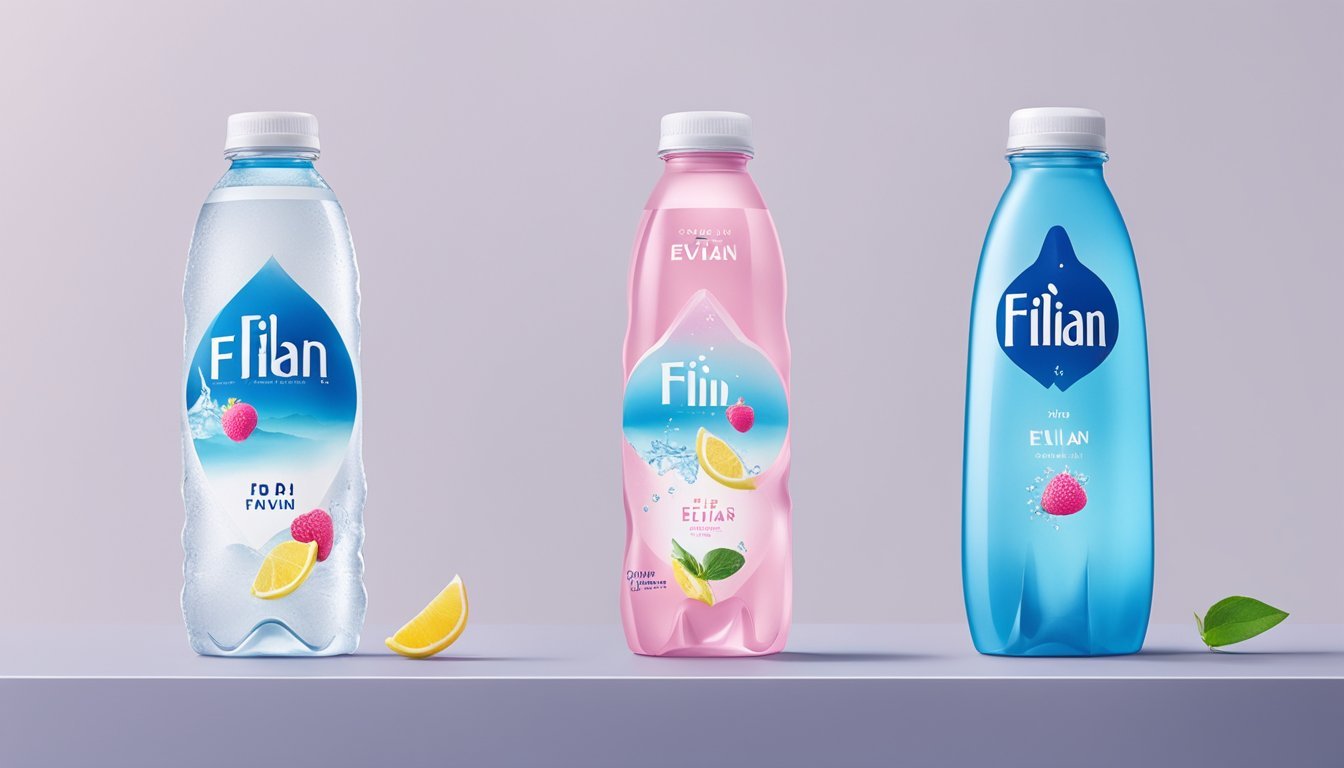Evian vs. Fiji
A Comprehensive Comparison of Bottled Water Brands
Comparing bottled water brands has become more than a matter of taste; it's a discussion of health, sourcing, and environmental impact. Fiji and Evian are two premium brands that often feature in this debate. They are both marketed as natural mineral waters with their unique sources: Fiji from an artesian aquifer in the Fijian Islands and Evian from the French Alps. As discerning consumers value purity and pH levels alongside taste and branding, these factors become focal points in determining which water is superior.
In recent comparisons, Fiji water reportedly had a slight edge over Evian when it came to pH levels, which are an indicator of acidity or alkalinity. A perfectly neutral pH is measured at 7.0. While neither brand reaches this exact mark, Fiji's pH tends to be slightly more acidic, closer to neutrality, with tests showing an average pH of 6.96, compared to Evian's 7.07. However, pH alone doesn't determine a water's quality. The taste, which can be influenced by the mineral composition and the source of the water, is also a critical aspect for many consumers.
In the ongoing debate, personal preference weighs heavily. Some individuals may prefer the silky texture and taste of Fiji water, while others may favor the crisp, refreshing feel of Evian. Each brand holds its own in terms of branding and global recognition, and loyalty often depends on an individual's palate, values, and how they weigh the importance of a product's backstory and ecological footprint. With both brands offering distinct experiences, the choice ultimately comes down to personal preference, despite what slight variations in scientific tests may reveal.
The Significance of Bottled Water
The role of bottled water in today's society can be seen through its burgeoning industry and its pivotal contribution to hydration and health.
Bottled Water Industry Overview
The bottled water industry has witnessed substantial growth, becoming a significant sector within the beverage market. Consumers opt for bottled water for various reasons, such as taste preference, convenience, and perceptions of purity. Bottled water options are vast, ranging from mineral and spring waters to purified and enhanced products. Clean and safe water is a key selling point, especially in areas where tap water quality may be compromised.
Global Reach: Bottled water is consumed worldwide, with companies like Evian and Fiji among the prominent brands.
Market Trends: There is a trend toward sustainable packaging as environmental concerns over plastic usage continue to rise.
Understanding Hydration and Health
Hydration is essential for good health. The human body requires water to perform crucial functions, and failure to maintain hydration can lead to negative health outcomes. Bottled water provides a convenient and controlled way to stay hydrated, especially for consumers on the go or those who do not have access to safe tap water.
Health Benefits: Drinking sufficient water can aid in digestion, improve skin health, and boost energy levels.
Quality Assurance: Brands like Evian and Fiji often undergo rigorous testing to ensure their bottled water meets high standards of quality and safety.
Analyzing Water Sources
In this section, readers will gain insights into the unique journeys taken by water from their origins at Evian and Fiji before being bottled. Understanding the different types of sources—spring water and artesian water—sheds light on the distinct qualities of each brand.
The Journey from Source to Bottle
Evian originates from the French Alps, where rain and snow filter through glacial sand and rock over a 15-year journey, enriching the water with minerals. Fiji Water, on the other hand, is collected from an underground aquifer in the Fiji Islands, protected by volcanic rock that gives it its signature soft mouthfeel and mineral profile.
Spring Water vs. Artesian Water
Spring Water: Comes from natural springs, like Evian, typically sourced at an ice mountain or natural spring.
Artesian Water: Sourced from confined, underground aquifers. Fiji Water is a prime example of natural artesian water, derived from a protected aquifer that's naturally purified.
Role of Natural Elements in Water Quality
Natural elements play a crucial role in the quality of water:
French Alps provide Evian with a unique mineral composition, including a balance of electrolytes and a neutral pH.
Volcanic Rock in Fiji acts as a natural filtration system, adding silica and contributing to Fiji Water's soft and smooth taste.
Comparative Analysis of Evian and Fiji
In examining Evian and Fiji bottled waters, specific metrics such as mineral content, pH levels, taste profiles, and purification processes are essential to understanding their quality and health benefits.
Mineral Content and Its Benefits
Evian water sources from the French Alps and is known to contain various minerals like calcium and magnesium. These minerals are vital for bone health and metabolic processes. Fiji Water is drawn from an aquifer in Fiji and contains silica, a mineral claimed to provide health benefits such as improved skin health.
Mineral Evian Fiji Calcium Yes Trace Magnesium Yes Trace Silica No Yes
pH Levels and Their Significance
The pH level of bottled water indicates its acidity or alkalinity. A pH of 7 is considered neutral. Both Evian and Fiji Water have pH levels just below neutral, with Fiji having an average pH of 6.96, making it slightly more acidic, and Evian a bit more alkaline with a pH of 7.07.
Brand pH Level Evian 7.07 Fiji 6.96
Taste Profile and Consumer Preferences
Many consumers prefer their bottled water to have a clean and refreshing taste, which can be influenced by the source and mineral content. Evian is often described as having a smooth taste due to its balanced mineral content. Fiji Water, with its unique mineral profile, offers a soft mouthfeel and a taste that many find pleasing.
Purification Processes
Both Evian and Fiji brands undergo rigorous purification. Evian undergoes a natural filtration process through glacial sands that imbue it with electrolytes and minerals. Fiji Water applies its signature Hydro-7 filtration method, a multistage process that includes reverse osmosis and treatment with ozone to remove impurities, ensuring their water's purity.
Environmental and Sustainability Considerations
When evaluating the environmental and sustainability aspects of bottled water brands like Evian and Fiji, it is essential to consider their impacts on ecosystems, recycling initiatives, and the overall environmental footprint that consumer choices can drive.
Impacts on Ecosystems and Resources
The production and sourcing of bottled water have significant impacts on local ecosystems. Evian sources its water from the French Alps, where the company claims to follow sustainable practices to preserve the water's purity and the surrounding environment. Contrastingly, Fiji Water extracts its product from an aquifer in Fiji, which raises concerns about strain on local water resources and effects on the island's ecosystems. Both companies must manage their water extraction rates and engage in ecosystem conservation to minimize their environmental impact.
Bottled Water and Recycling Initiatives
The bottled water industry is a major consumer of plastic, and initiatives to increase the use of recycled plastic are crucial. Evian has pledged to become a circular brand by 2025, with bottles made from 100% recycled plastic, a step they are taking to align with sustainability goals. In a similar vein, Fiji Water has announced efforts to transition to 100% recycled plastic (rPET) for all its bottles. These initiatives not only reduce the reliance on new plastic production but also help mitigate the vast amounts of waste generated by the industry.
Consumer Choices and Environmental Footprint
Consumers play a pivotal role in reducing the environmental footprint of bottled water. Opting for brands that prioritize recycled materials and sustainability can drive change within the industry. Moreover, by selecting products with lower environmental impact and supporting companies with strong recycling programs, consumers help push the industry toward more eco-friendly practices. Additionally, the choice to use reusable water bottles when possible can significantly decrease the demand for single-use bottled water, which often ends up in landfills and contributes to pollution.
Consumer Guides
In assessing which bottled water is better between Evian and Fiji, consumers often consider labeling, marketing strategies, the results of taste tests, and the price-to-value ratio. These factors play significant roles in informed decision-making.
Understanding Labeling and Marketing
Evian and Fiji are top bottled water brands that leverage their source and purity as part of their marketing. Evian's label indicates that it originates from the French Alps, while Fiji water claims its uniqueness from the tropical Fiji Islands' aquifers. When selecting bottled waters, consumers should understand that terms like "spring water" and "artesian water" can impact their choices. Marketing and labeling should not be the sole basis for preference; they should rather facilitate a deeper understanding of the product's origin and processing.
Blind Taste Tests and Results
Blind taste testing can offer unbiased insights into the quality of water, devoid of brand influence. A blind taste test comparing Evian and Fiji revealed that Fiji had a slightly superior average pH level, closer to the neutral 7.0 mark. However, consumers' preference for taste is subjective; some may prefer the slight minerality of Evian, while others may favor Fiji's softer taste. Therefore, taste test results can vary, but they are a crucial component of evaluating the top water bottle brand.
Price Comparison and Value Assessment
Considering the price of Evian and Fiji is essential for a value assessment. Evian and Fiji are both premium brands, thus often more costly than other bottled waters and tap water. A price comparison shows:
Brand Average Price per Liter Evian $1.35 Fiji $1.45
While Fiji tends to be slightly more expensive, consumers should weigh if the higher price correlates with their personal preference in taste and the importance of water source. It's worth noting that tap water, generally safe for consumption, is a far less expensive option and may suit those prioritizing price over brand.
Final Thoughts
Choosing between Evian and Fiji waters involves a deeper understanding of individual preferences and the nuances in their characteristics, such as mineral content and pH levels.
Choosing the Right Bottled Water for You
Consumers should consider the mineral content and pH levels of bottled water, as these can influence both taste and potential health benefits. Evian, sourced from the French Alps, and Fiji, sourced from an artesian aquifer in the Fiji Islands, both contain essential minerals, yet their profiles differ. Evian is known for its higher mineral content, which may contribute to its distinct taste. On the contrary, Fiji Water typically has a slightly lower pH, closer to neutral, which some find preferable.
When opting for convenience, one must also contemplate the brand's availability and the individual's allegiance to sustainability practices. PepsiCo, associated with Fiji Water since 2015, has a widespread distribution network, potentially making Fiji more accessible in certain markets.
Future of Bottled Water Consumption
The bottled water industry is adapting to consumers' growing environmental and health consciousness. Both Evian and Fiji are making strides towards more sustainable packaging and have committed to reducing their carbon footprints. As consumers continue to prioritize not only the quality but also the environmental impact of their purchases, these factors will increasingly influence the choice of bottled water.
In addition, with a rising trend in eco-consciousness, the industry may see a shift toward more renewable practices and eco-friendly packaging, making brand sustainability commitments as crucial as the product itself.






